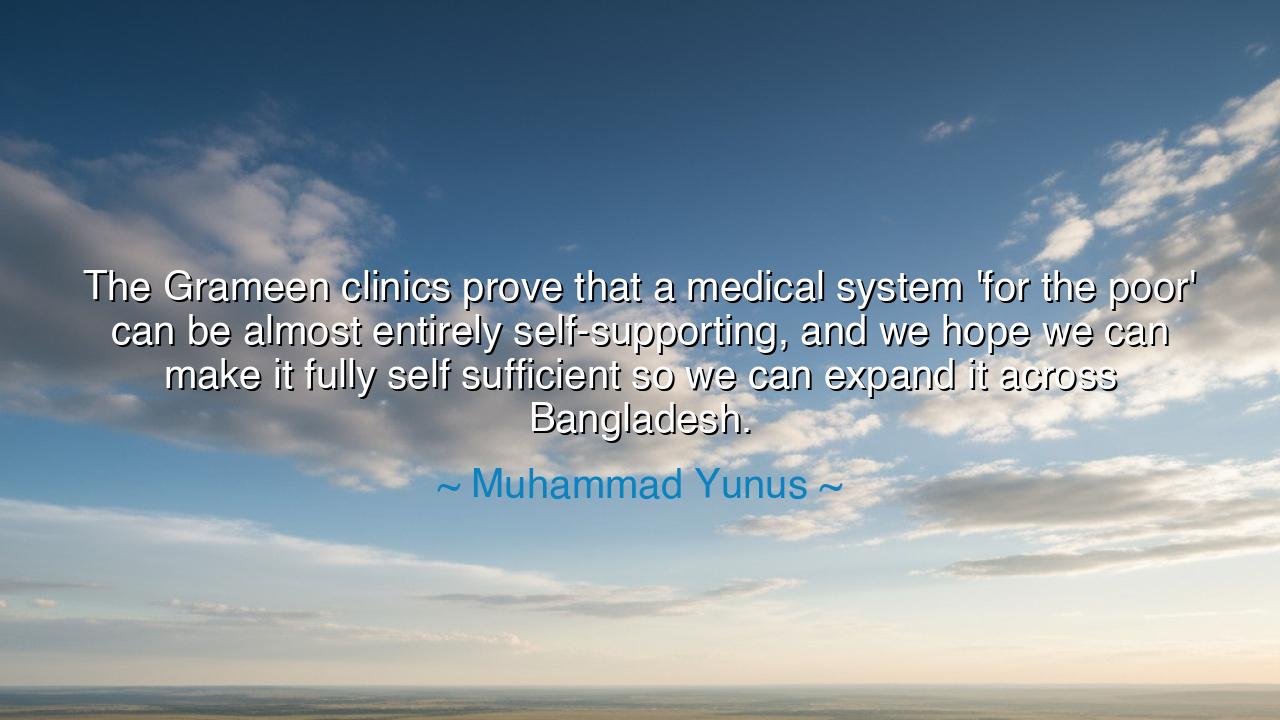
The Grameen clinics prove that a medical system 'for the poor'
The Grameen clinics prove that a medical system 'for the poor' can be almost entirely self-supporting, and we hope we can make it fully self sufficient so we can expand it across Bangladesh.






When Muhammad Yunus declared, “The Grameen clinics prove that a medical system ‘for the poor’ can be almost entirely self-supporting, and we hope we can make it fully self-sufficient so we can expand it across Bangladesh,” he was speaking as one who had not only witnessed poverty but had wrestled with it, reshaped it, and dared to dream beyond it. His words rise like a hymn to human dignity — a declaration that compassion and sustainability can walk hand in hand, that medicine, like hope, should never belong only to the wealthy. In this vision, Yunus reveals the heart of his life’s work: to show that systems built upon trust, empowerment, and respect for the poor can flourish where charity and dependence have failed.
To the ancients, the act of healing was sacred — a covenant between the healer and the soul. In Yunus’s vision, that covenant extends beyond the individual to the entire community, where every citizen becomes both healer and guardian. The Grameen clinics were born from this philosophy. They were not monuments of grandeur, but temples of practicality — small centers built to serve those whom the world often overlooks. Their power lay not in luxury, but in sustainability. By charging modest fees, training local staff, and reinvesting what they earned, these clinics began to sustain themselves, proving that healthcare for the poor need not depend on the pity of the rich. Yunus, like a modern philosopher-king, sought to replace the chains of dependence with the freedom of self-reliance.
The origin of his vision reaches back to the founding of the Grameen Bank, the institution through which Yunus revolutionized the world’s understanding of poverty. He saw that the poor were not helpless — they were simply denied access to opportunity. Just as microcredit allowed the poor to become entrepreneurs, the Grameen clinics allowed them to become partners in their own health. Patients paid what they could, and their small contributions, multiplied by thousands, began to sustain an entire network of medical care. In a nation once paralyzed by the belief that aid must come from above, Yunus showed that empowerment from within is stronger and more enduring. His words about self-sufficiency are not merely practical — they are revolutionary.
Consider the story of Rokeya, a mother in rural Bangladesh, who once had to walk miles to reach a distant hospital, often too late to save her child from fever or infection. When a Grameen clinic opened in her village, she gained not only access to medicine, but to knowledge — about nutrition, sanitation, and care. Her children survived, her family thrived, and she began to teach others. This is how Yunus’s vision spreads: not through charity’s fleeting touch, but through the awakening of collective strength. The Grameen model does not simply treat illness; it heals the social fabric itself, by turning dependence into dignity.
The ancients would have understood this deeply. In the teachings of Confucius, a good society is one in which people learn to sustain one another through virtue and discipline, not through endless gifts. Likewise, the philosopher Plato spoke of a just city where each part supports the other — the rulers, the workers, the healers — each contributing to the good of the whole. Yunus’s self-sufficient medical system is an echo of that ancient harmony. It is the belief that the health of a people cannot rest on endless external aid, but must spring from their own shared purpose, from the realization that even the smallest contribution builds a greater good.
Yet Yunus also reminds us that such visions demand discipline, innovation, and faith. To build something self-sufficient in a world accustomed to dependence is to walk a narrow path. It means resisting both greed and despair. It means teaching the poor to see themselves not as recipients of mercy, but as partners in progress. This transformation — from helplessness to ownership — is the heart of his philosophy, and perhaps the hardest lesson for the world to learn. For it requires the humility of the powerful and the courage of the powerless.
The lesson of Muhammad Yunus’s words is thus clear and eternal: true compassion does not create dependence; it creates empowerment. A gift that keeps a man alive for a day is kindness, but a system that allows him to sustain himself for life is wisdom. The future of humanity depends on this balance — on building institutions that honor both the need for care and the capacity for self-reliance. The Grameen clinics, humble as they may seem, embody this truth: that progress must be both merciful and sustainable, rooted in respect for human potential.
And so, let these words endure as a guiding flame for all who seek to heal the world: build systems that uplift, not bind; teach self-sufficiency where others preach charity; and see in every human being not a burden, but a source of power. For as Yunus has shown, when the poor are trusted with their own strength, they rise higher than pity ever allowed — and in their rising, they lift the world with them.






AAdministratorAdministrator
Welcome, honored guests. Please leave a comment, we will respond soon